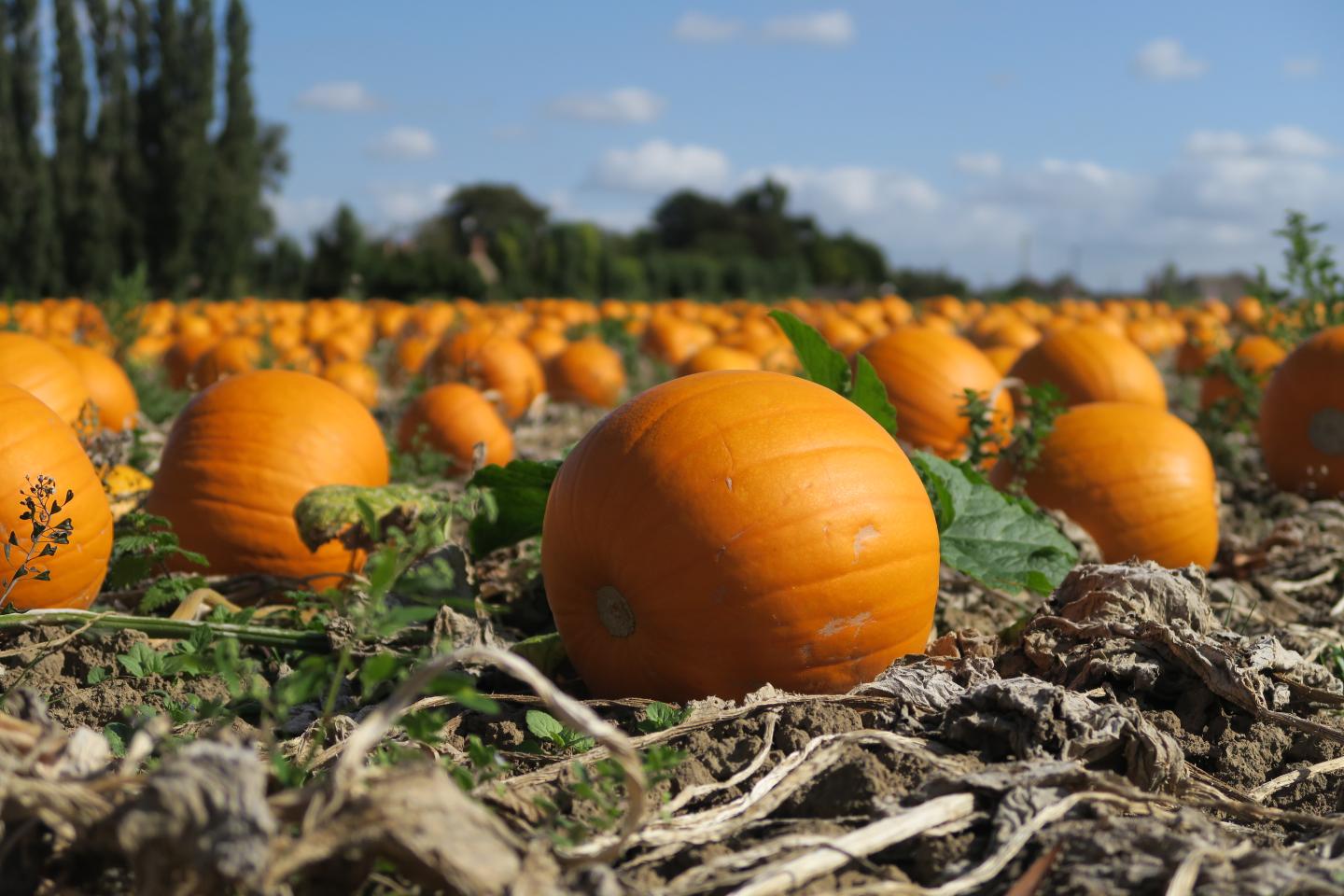
Thank you for continuing to subscribe to our monthly newsletter. We hope you continue to find the content useful and we welcome any feedback or suggestions on topics that you would like to see covered in future editions of the newsletter.
FAS technical advice line: 03000 200 301
- Key dates to be aware of…
- How can we help you?
- September / October webinar recordings now available: Expanded Sustainable Farming Incentive offer 2024 (Defra) & How FAS and Catchment Sensitive Farming can support your farm business
- Environment Agency is helping to investigate ammonia emissions in the Glens river catchment – a case study
- EA Resources are now available on the FAS website: Agriculture regulation guide booklet; Harvesting Success & Winter Winter Ready Campaign FAQ
- Catchment Sensitive Farming visits Duchy Agricultural College
- Trees on farm: Integrating trees into your livestock business, Funding extended to help fell diseased trees & Registering with the Woodland Carbon Code
- Reminder to apply to renew your water abstraction licence at least three months before it expires
- Updates from the Defra Farming blog and industry announcements
- Stay up to date with us
If you hold a (authorising abstraction wholly within the months of April to October), the Environment Agency will make actual abstraction return forms available to you from 31 October. You then have 28 days to send your readings to the Environment Agency (GOV.UK).
You can burn heather, rough grass, bracken, gorse or vaccinium on land other than in upland areas from this date (GOV.UK).
In case you missed them...
You can burn heather, rough grass, bracken, gorse or vaccinium on land in upland areas from this date. (GOV.UK)
For any land located in a Nitrate Vulnerable Zone (NVZ), this is the start of the closed period for applying organic manure with a high readily available nitrogen content (for example, slurry, poultry manures or liquid digested sewage sludge) to tillage land on soils which are not shallow or sandy. (GOV.UK)
For any land located in a NVZ, this is the start of the closed period for applying organic manure with a high readily available nitrogen content (for example, slurry, poultry manures or liquid digested sewage sludge) to grassland on soils which are not shallow or sandy. (GOV.UK)
For more details about the information provided in the key dates table, visit the Rules for Farmers and Land Managers and the relevant pages of GOV.UK
From 3 January 2024 the following grants opened for application
• Capital Grants 2024
• Higher Tier Capital Grants 2024
• Protection and Infrastructure Grants 2024
• Woodland Management Plan (WMP) Grants 2024
• Woodland Tree Health (WTH) Grants
• Implementation Plan Grant (PA1) or Feasibility Study Grant (PA2)
Key Dates for Annual Declaration Submission
To assist Sustainable Farming Incentive (SFI) agreement holders, the Rural Payments Agency (RPA) have outlined the opening and closing dates for the annual declaration submission based on the start date of the agreement:
| Agreement start date | Declaration period opens | Declaration period closes |
|---|---|---|
| 1 October 2023 | 1 August 2024 | 30 September 2024 |
| 1 November 2023 | 1 September 2024 | 31 October 2024 |
| 1 December 2023 | 1 October 2024 | 30 November 2024 |
| 1 January 2024 | 1 November 2024 | 31 December 2024 |
| 1 February 2024 | 1 December 2024 | 31 January 2025 |
| 1 March 2024 | 1 January 2025 | 28 February 2025 |
| 1 April 2024 | 1 February 2025 | 31 March 2025 |
| 1 May 2024 | 1 March 2025 | 30 April 2025 |
| 1 June 2024 | 1 April 2025 | 31 May 2025 |
| 1 July 2024 | 1 May 2025 | 30 June 2025 |
| 1 August 2024 | 1 June 2025 | 31 July 2025 |
| 1 September 2024 | 1 July 2025 | 31 August 2025 |

Free and confidential advice
The FAS is funded by the Department for Environment, Food and Rural Affairs (Defra). We provide free, confidential advice to help farmers and land managers in England understand and meet the legal requirements in English law around certain farming activities to protect people, livestock and the environment. We update the farming sector on relevant government farming policy that is applicable in England and on the actions that can be taken to help farmers comply with the relevant regulations.
Our website hosts our previous newsletters, as well as technical resources and webinars that cover various topics in more detail.
Contacting the advice line:
Farmers requiring telephone advice can contact the FAS technical advice line on 03000 200 301, Monday to Friday, between 08:30 and 17:00. The Rural Services Helpline provides a single number for all FAS, Rural Payments Agency (RPA), Animal and Plant Health Agency, Natural England and forestry enquiries.
You can also email enquiries to advice@farmingadviceservice.org.uk. Our helpline team aims to respond to all telephone and email enquiries within one working day.
You can also now speak to our helpline team through the new online chat function on the farmingadviceservice.org.uk website.
The advice given to individual farmers is confidential – we do not disclose any personal or individual information or data obtained during advisory activities.
Defra: Expanded Sustainable Farming Incentive offer 2024
On Thursday 26 September, Defra held a webinar for farmers to discuss the guidance, actions and details of the expanded Sustainable Farming Incentive (SFI) offer.
Topics covered included endorsed actions and updates to terms and conditions.
Janet Hughes, Farming and Countryside Programme Director, was joined by policy leads working on SFI and colleagues from the RPA and Catchment Sensitive Farming.
The webinar was delivered in collaboration with FAS and The Farming Forum (TFF).
The recording of this webinar is available above as well as on the events page on the FAS website, the Defra farming blog and the webinars in 2024 page.
Further information on the topics covered can be found in a Defra blog post on SFI and agri-environment schemes.
It includes a link to the ‘Find funding for land or farms’ tool, which will give you an idea of the actions you could include in your SFI agreement.
On Monday 21 October the Farming Advice Service and Catchment Sensitive Farming provided a webinar on their new partnership and how it will help farm businesses access guidance and navigate change. The collaboration brings together the strengths of two respected organisations, enhancing the support available to help farmers understand rules and regulations, navigate Sustainable Farming Incentive (SFI) options and advance efforts to improve water, air, and soil quality through locally tailored expertise.
Links mentioned in the webinar can be found below:
- CSF Get In Touch webpage
- CSF Events webpage
- FAS Helpline:
- Technical advice line: 03000 200 301
- advice@farmingadviceservice.org.uk
- Or chat to our team online - SFI expression of interest page opens
- Defra Farming blog on SFI endorsed actions
- GOV.UK Guidance webpage for changing uncultivated, semi-natural and rural land: when you need permission.
The webinar includes examples of support offered by each team, and a Q&A session.
The webinar recording is available above as well as on the events page of the FAS website.
An Environment Agency (EA) team monitoring water quality in the Glens river catchment discovered spikes in ammonia levels in various parts of the catchment over time.
Suspecting agricultural activity as the potential source, an Agricultural Regulatory Inspection Officer (ARIO) conducted an upstream farm visit and identified several non-compliances that required attention. The proactive farm owner worked closely with the officer to address these issues.
Seven specific actions were recommended, including relocating a temporary muck heap that had been placed too close to a ditch — a problem worsened by the wet winter. The farmer successfully completed all seven actions, resulting in significant environmental improvements.
Additionally, the farmer was referred to Catchment Sensitive Farming (CSF), which assisted with slurry storage calculations and helped to create a drainage plan, further enhancing the farm’s environmental management.
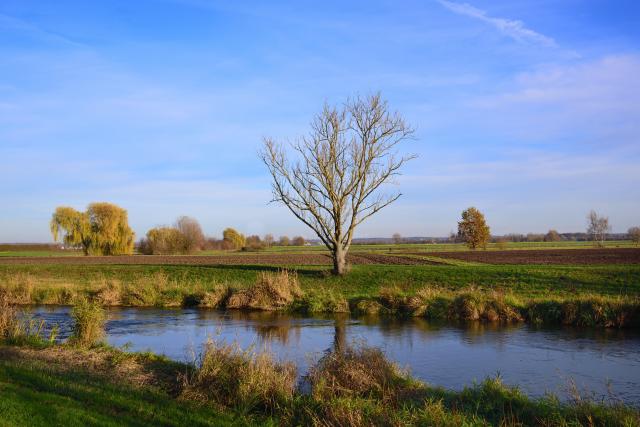
During the same visit, the ARIO identified another pollution source from some rural properties. To address this, a guidance letter was sent to the property owners detailing how to resolve the issue. The estate manager overseeing the properties has since cooperated in resolving the issue.
Since then, water quality monitoring in the watercourse has continued to show improvements in ammonia levels, indicating that the actions taken have successfully reduced ammonia inputs within the catchment.
The ARIO continues to monitor the data and is prepared to follow up with the farm if any further significant spikes occur, potentially investigating other pollution sources if necessary. This example highlights how a cooperative approach can lead to wide-ranging benefits for all parties involved and underscores the importance of engagement to achieve positive environmental outcomes.
Agriculture regulation guide booklet
The Environment Agency (EA) has introduced a new regulatory guide for farmers, titled Harvesting Success, which is available free of charge. This guide comprehensively covers all aspects of agricultural regulations and best practices for water quality. It is the first resource to consolidate regulations and guidance for Farming Rules for Water, the Silage, Slurry and Fuel Oil Regulations, and Nitrate Vulnerable Zones in England into one convenient reference. Additionally, it offers a wealth of information on good agricultural practices to help farmers and land managers remain compliant.
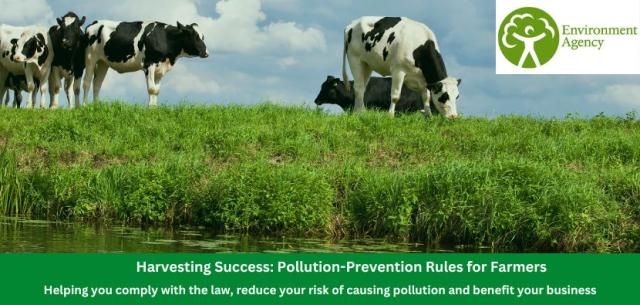
A digital copy is available on the FAS website or you can order a hard copy through the Environment Agency’s national customer contact centre by email or telephone: enquiries@environment-agency.gov.uk, Tel. 03708 506 506
Frequently Asked Questions about the EA’s Winter Ready Campaign
As part of the Environment Agency's Winter Ready campaign they have produced a companion FAQ document.
The document is being used by EA officers and has also been written for public use. The FAQ's cover the following topics:
- What is the Environment Agency’s Winter Ready campaign and why is it being run
- What are the regulations regarding manure storage and spreading in winter
- What do farmers need to do to be Winter Ready
- What support and guidance is available to farmers to achieve this winter readiness
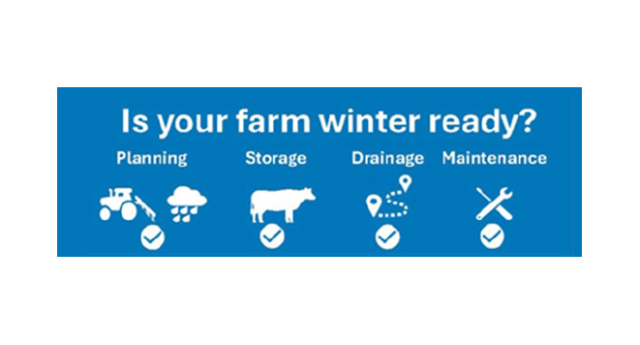
The EA is asking famers to contact them if they are concerned about pollution risks on their farm. Telephone: 03708 506 506 (Monday to Friday, 8am to 6pm) or email: enquiries@environment-agency.gov.uk
If pollution occurs, call the Environment Agency incident hotline on: 0800 80 70 60
The Duchy Agricultural College gave Catchment Sensitive Farming (CSF) and LEAF (Linking Environment and Farming) a video tour to explain their slurry management system and share improvements they have made to increase sustainability and efficiency:
- Low Emission Flooring – to reduce the chemical reactions from mixing urine and faeces
- Automatic Scrapers – frequent removal of slurry reduces the amount of ammonia released
- Cow Diet – excess crude protein in a cow’s diet increases ammonia emissions
- Slurry Additives – can reduce emissions during storage, increasing the nitrogen then applied to the soil
CSF can advise you on sustainable slurry management and discuss the grant options available to you. You can get in touch with your local team here.
CSF is led by Natural England in partnership with Defra, the Environment Agency and the Forestry Commission. It works with farmers, communities and organisations across England to improve the quality of water, air and soils and to reduce flood risk.
Integrating trees into your livestock business - Northumberland farm case study
Great Northumberland Forest has provided a case study that describes how a farmer has integrated woodland into their livestock system.
Duncan Nelles, who farms in Northumberland, has planted native trees on his organic farm to provide shade and shelter for his cattle. The low-density planting began in January 2024 on the first three hectares.
“The trees don’t impact the grazing so my bottom line isn’t affected... It's important anything we add or change on the farm will keep our cost structure steady. We’ve got the option to go into Countryside Stewardship for the agroforestry on current numbers or increase the density, giving us further income, but we know if we don't go ahead with that, we have increased biodiversity and have not lost grazing. As we’re organic, we use the wool to replace chemical control at the base of the cactus guard. Each tree has a deer guard tube too, giving the trees extra protection.”
Now that native trees have been planted on the riparian fields along the river, Duncan is now looking where else on the holding agroforestry might play a part.
You can hear more from Duncan about the impact and benefit of trees on his farm in the video above.
If you are thinking of incorporating trees into your farm business, your local woodland creation team can talk through the grants that are available and how they could provide you with additional farm income.
Visit the Put Down Roots - Woodland Creation for Farmers campaign page for further information.
Funding extended to help fell diseased trees
The Forestry Commission has extended the tree health pilot scheme. The tree health pilot scheme tests different ways to slow the spread of pests and diseases, such as ash dieback, to increase the resilience of trees in England.
The pilot provides grants to farmers and landowners to pay for the felling of diseased trees, and for the treatment, restocking and maintenance of newly replanted trees after a pest or disease outbreak.
The scheme is open now and farmers can receive funding from other agri-environment or woodland initiatives at the same time as long as it does not duplicate payments for carrying out the same activity. The pilot operates in the following regions: North West, West Midlands, South East, London and East Anglia (in the Ips Typographus demarcated area).
More information on the support to farmers on this scheme can be found here: Extending the tree health pilot scheme.
You can apply for the Tree Health Pilot here or contact the Forestry Commission at thpilotenquiries@forestrycommission.gov.uk.
Registering with the Woodland Carbon Code before work begins on site
If you are considering planting trees through the Forestry Commission’s England Woodland Creation Offer, you can access additional income by registering your scheme with the Woodland Carbon Code before you begin planting. The Woodland Carbon Code is the quality assurance standard for UK woodland creation projects that address climate change by removing carbon dioxide from the atmosphere.

The Woodland Carbon Code provides independently verified carbon units that landowners and farmers can sell to generate income. Companies are able to buy the carbon units generated by the woodland to compensate for their emissions.
To be eligible, projects must be registered before work begins on site, including ground preparation and fencing.
To find out more, visit www.woodlandcarboncode.org.uk.
There are currently over 1,000 time-limited water abstraction licences, or water abstraction licences with time limited conditions that are set to expire on or before 31 March 2025. If you hold a water abstraction licence where the whole licence, or one or more conditions within the licence is approaching expiration, and you want to be able to continue abstracting after the expiry date, then you will need to apply to renew your licence. At present only ~350 applications to renew have been received by the Environment Agency (EA).
Applications to renew a water abstraction licence must be received by the EA no less than three months before the expiry date of your existing licence, or licence conditions. However, to provide sufficient time to process your application, it is recommended that you apply now, or as soon as possible.
Please complete this online form to apply to renew your licence with exactly the same terms for each license.
If you want to change any of the terms of your current licence at renewal, you need to submit a new licence application form.
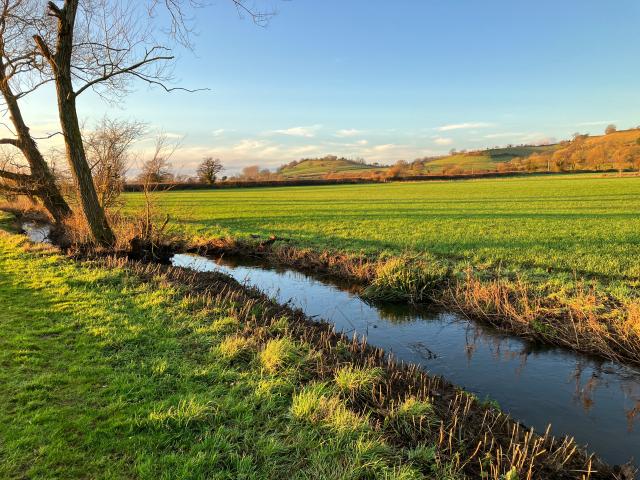
Review your abstraction licence requirements
Given the extreme weather with floods and droughts over the last few years, the EA is asking farmers to review their overall water requirements for irrigation etc. well ahead of next year and, if necessary, apply for or change, revoke or transfer a water abstraction or impoundment licence. The pre-application advice service can be used to check the likelihood of you getting a licence, what restrictions it may have and what you need to send with your application.
Refilling winter storage reservoirs
Please make sure you are in a position to begin refilling winter storage reservoirs at the start of the licence season by checking the physical integrity of pumps and equipment (including liners) now so that you can maximise water abstraction from river flows.
Abstraction returns
If you hold a water abstraction licence, which authorises abstraction wholly within the months of April to October, you may need to report your water abstraction return for the twelve-month period from 1 November 2023 to 31 October 2024.
If you need to submit a return, you will receive a notification from the EA at the end of October/beginning of November 2024, and you have until 28 November 2024 to submit your return.
In readiness for submitting your return online, you will need to have registered with the EA’s online digital service.
If you already have an online account and have applied for and received a new licence since you last submitted a return, including a renewal of a licence that had previously expired, you will need to link the new licence to your account. You can do this by accessing your account and selecting the ‘add licence’ option.
If you had a licence that expired during the period 1 November 2023 to 31 October 2024 (inclusive) a return may still be requested. To submit the return, you need to request a paper return form from the EA rather than submit online. You can contact the EA on 03708 506 506 or at enquiries@environment-agency.gov.uk

Defra regularly updates the Farming blog. Please subscribe to the blog to ensure you receive all the latest news.
Make your voice heard: Defra is seeking views from cattle farmers about bovine TB compensation
Defra has launched a new survey to learn more from cattle farmers in England about their experience and views around bovine TB compensation.
The questionnaire is part of a research study conducted by Scotland’s Rural College (SRUC) and RSK-ADAS. This study seeks to understand the types of action that farmers are taking to reduce the risk of herd breakdowns. This is part of ongoing work to help improve the management of bovine TB in England and boost disease eradication.
This is a unique opportunity to help the Government better understand the views of cattle farmers, who are facing the challenges of bovine TB. The information shared by those who complete the survey will help to inform any future review and development of TB compensation.
Participation in this survey is voluntary and you will not be asked any personal information that can identify you. You can also withdraw from the survey at any point without having to give a reason, and your information will not be retained.
Follow the link to find out more information and complete the survey.
Government provides certainty to horticulture and poultry businesses
On Monday 21 October, a package of measures to provide certainty and stability to farmers and growers in the UK’s horticulture, poultry and sheep sectors has been announced by Defra.
Underlining the government’s commitment to the horticultural and poultry sectors, the Seasonal Worker visa route has been confirmed for 2025, with a total of 43,000 Seasonal Worker visas available for horticulture and 2,000 for poultry next year.
As well as confirming visa numbers for 2025, Defra has also published the 2023 Seasonal Worker’s Survey report as part of Defra’s commitment to monitoring the welfare of the seasonal migrant workers who help bring home the horticulture harvest each year. The survey showed that the vast majority of respondents (91.0%) reported a positive experience from their time in the UK and 95% expressed a desire to return.
Alongside this, the government is taking action to deliver fairness in the supply chain for sheep farmers by ensuring producers receive a fair price for their livestock through legislation to mandate sheep carcase classification and price reporting.
The government also announced measures on egg and poultry labelling to help farmers deal with the impact of future avian influenza outbreaks. The changes will mean that free-range eggs can continue to be labelled as such throughout mandatory housing measures.
A consultation on introducing similar measures for the labelling of free-range poultry is also being launched.
For more information, you can read the full announcement on GOV.UK.
Reduce African swine fever risk through safe disposal of food waste
As we enter Autumn and approach the festive season, livestock keepers are reminded that it is illegal to feed catering waste of any description or domestic food waste to farm animals in the UK, including pigs kept as pets, due to the risk of disease outbreaks. This includes things like Halloween pumpkins.
Some of the outbreaks of African swine fever in Europe have been attributed to wild boar or domestic pigs consuming contaminated pork or pork products. Viruses, such as foot and mouth disease, could also be introduced to the UK through food products. This includes food from vegetarian kitchens, as there is still a risk of cross contamination from products of animal origin, such as milk.
There has never been a case of African swine fever in the UK and it does not affect humans, but it is potentially fatal to pigs. If the disease were to reach the UK, it could have a devastating effect on the domestic pig industry and pork exports.
Strict hygiene measures are essential in preventing disease – people should not take meat or meat products into areas where pigs are kept and should only eat food in designated areas such as staff rooms or the farm kitchen. Pig keepers, farm staff and anyone in contact with pigs should wash their hands before and after eating or preparing food.
Read more information about how to prevent African swine fever and reduce disease risks from food waste.
Check your current status: Restriction Zone extended in England after further Bluetongue virus (BTV-3) cases confirmed
In response to the number of bluetongue (BTV-3) cases rising in England and northern Europe, Defra has taken action to extend the Restriction Zone (RZ) and mitigate the spread of the disease. Livestock keepers should check if they are located in a disease control zone using APHA’s interactive bluetongue zone map.
All keepers of susceptible animals (cattle, sheep, goats, deer and other ruminants and camelids, including llamas and alpacas) in a RZ will need to follow strict rules on animal and germinal product movements.
These restrictions mean that susceptible animals cannot be moved out of a RZ without a specific licence. A general licence to move animals to designated abattoirs is available. Movements within a RZ are permitted.
On 4 September 2024, Defra announced that the Secretary of State has permitted the use of three unauthorised bluetongue serotype 3 (BTV-3) vaccines in the UK. These vaccines cannot be used without an appropriate licence and are likely only to reduce clinical signs – they will not provide immunity from the disease.
This means vaccinated animals will not be exempt from any government disease management controls. Animal keepers will need to work closely with their veterinarians to make a decision on use.
Follow the link for more information on BTV-3 vaccines, zones and the latest situation.
Bird registration now mandatory in England & Wales
Bird registration helps to mitigate and manage the spread of exotic disease, such as avian influenza, and keep birds safe. Registration with the Animal and Plant Health Agency (APHA) is now a legal requirement in England & Wales for those with any number of birds.
The APHA online registration portal is currently offline but will return soon. In the meantime, keepers in England and Wales can continue to register by completing the relevant form (depending on if you keep more than 50 or less than 50 birds) and returning by email or post.
Bird keepers in Scotland must register their birds on the Scottish Kept Bird Register (SKBR) by 1 December 2024.
Time for bird keepers to prepare: Highly Pathogenic Avian Influenza (HPAI) risk levels increased
Highly Pathogenic Avian Influenza (HPAI) H5N5 has been detected in a number of wild birds in Great Britain this autumn, including the first reported HPAI-related wild bird mass mortality of the season.
The risk of highly pathogenic avian influenza (HPAI) H5 in wild birds in Great Britain has increased from LOW (event is rare but does occur) to MEDIUM (event occurs regularly). The risk of poultry exposure to HPAI H5 in GB remains assessed as LOW where there is suboptimal or poor biosecurity but VERY LOW where good biosecurity is consistently applied at all times.
The finding of HPAI H5N5 follows previous findings in GB, and recent detections of both HPAI H5N5 and HPAI H5N1 in continental Europe. Risk levels are regularly reviewed and may increase further this winter,
Whilst the UK does not currently have outbreaks of HPAI in poultry or other captive birds and the UK has World Organisation for Animal Health (WOAH) self-declared freedom from HPAI, keepers must remain vigilant and practice rigorous biosecurity to maintain this status and protect the health and welfare of their birds. Find advice on how to protect your birds in Defra’s biosecurity guidance.
All bird keepers must register their poultry and other captive birds (with the exception of certain psittacines and passerines), even if only kept as pets. Registered keepers will receive regular updates and guidance to help protect their birds from avian influenza. In addition, anyone can subscribe to APHA’s free animal disease alerts service for the latest information regardless of whether they keep birds.
Further information on the latest situation and guidance can be found at GOV.UK.
Rural Payments Agency Blog
To stay up to date with the latest information and updates from the Rural Payments Agency (RPA), sign up to the RPA Blog. You can also listen to the RPA Podcast, which has been launched to help farmers, landowners and rural communities keep up to date with the latest news from the RPA. You can also follow the RPA on social media:
- X @ruralpay
- Facebook: facebook.com/RuralPaymentsAgency
- YouTube: Rural Payments Agency
- Instagram: ruralpay
Stay up to date with us
Get the latest updates by following us on X (formerly Twitter)
Follow us on @DefraFAS for up-to-the-minute updates on publications, events and industry information.
Follow and like our new Facebook page @Farming Advice Service - FAS for all the latest FAS updates!
Subscribe to our free monthly newsletter
If you don’t already receive our monthly FAS newsletter, please visit farmingadviceservice.org.uk and enter your email address into the newsletter sign-up box.
Alternatively, please email bookings@farmingadviceservice.org.uk, with ‘Register for newsletter’ in the subject line.
In line with data protection regulations, such as the General Data Protection Regulation (GDPR) and the UK Data Protection Act 2018, the FAS has updated its privacy policy to explain how your data is kept safe. To view the policy, please visit www.farmingadviceservice.org.uk/events/privacy/.